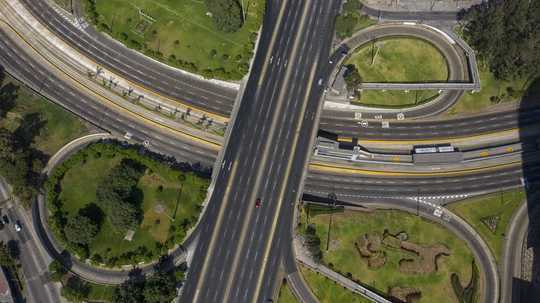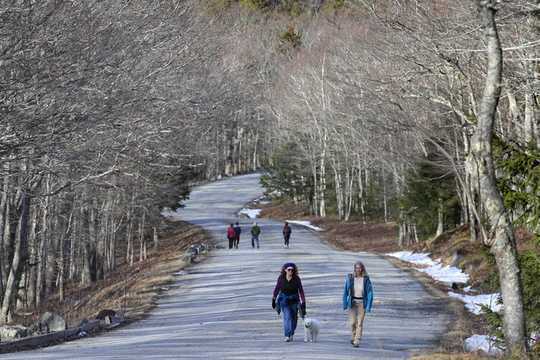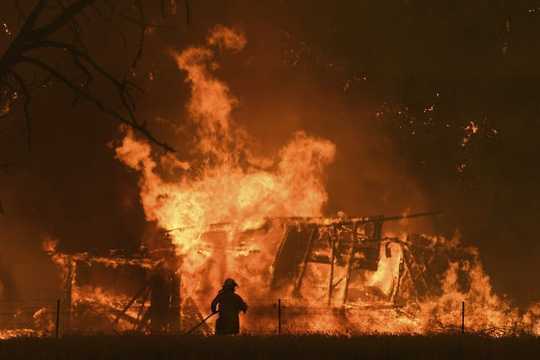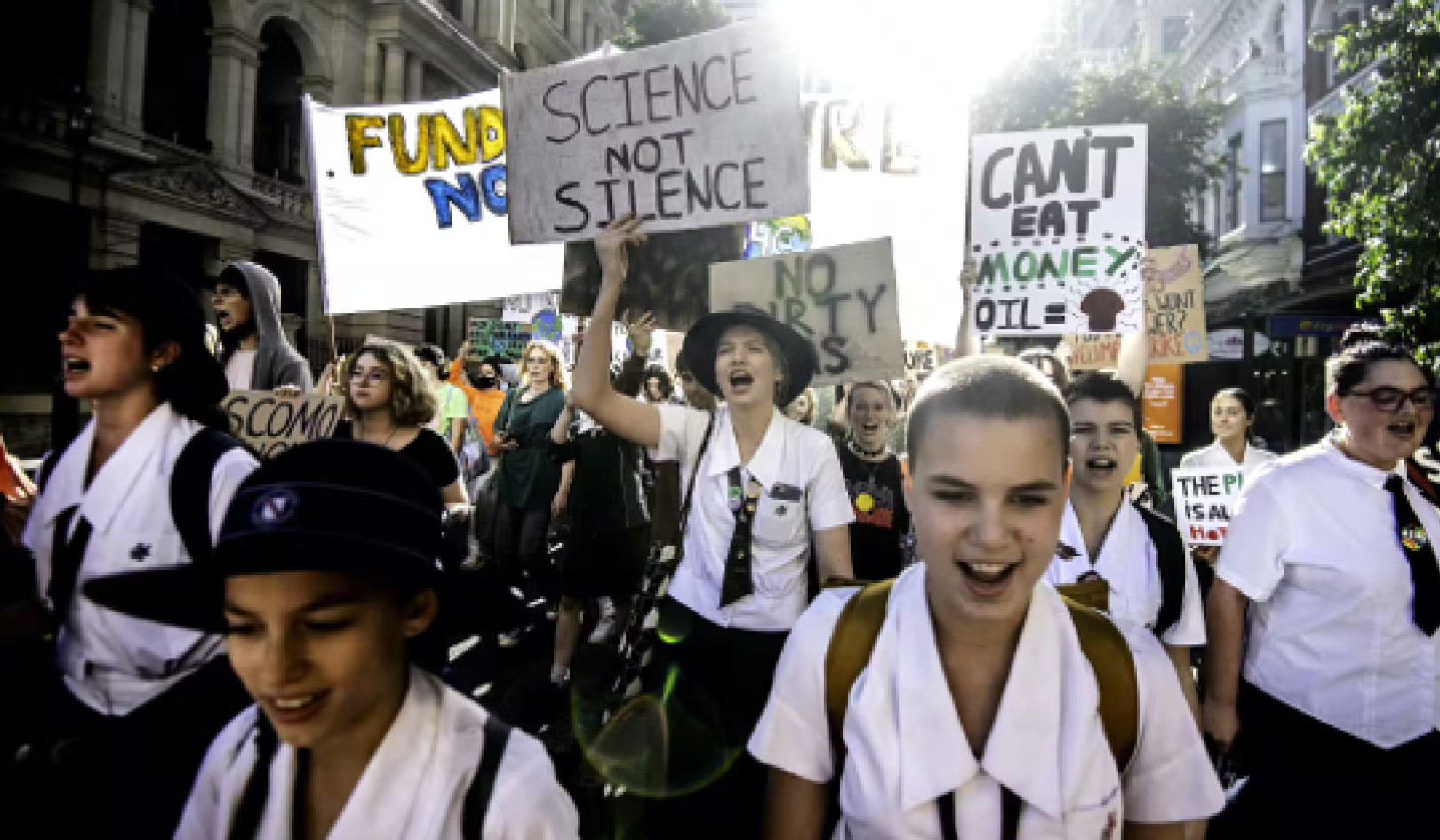 A highway exchange stands empty of traffic after the government implemented restrictions to prevent the spread of the new coronavirus in Lima, Peru, on March 18, 2020. Does the global response to COVID-19 suggest there’s hope for climate action? AP Photo/Rodrigo Abd
A highway exchange stands empty of traffic after the government implemented restrictions to prevent the spread of the new coronavirus in Lima, Peru, on March 18, 2020. Does the global response to COVID-19 suggest there’s hope for climate action? AP Photo/Rodrigo Abd
In the past few weeks, governments around the world have enacted dramatic measures to mitigate the threat of COVID-19.
It’s too soon to know whether these measures will prove too little to limit mass mortality, or so extreme that they set off economic catastrophe. But what is absolutely clear is that the pandemic response is in stark contrast to the lack of effective action on climate change, despite a number of similarities between the two threats.
The alarms for both COVID-19 and climate change were sounded by experts, well in advance of visible crises. It is easy to forget, but at the time of this writing, the total deaths from COVID-19 are less than 9,000 — it is the terrifying computer model predictions of much larger numbers that have alerted governments to the need for swift action, despite the disruption this is causing to everyday life.
Yet computer models of climate change also predict a steady march of increasing deaths, surpassing 250,000 people per year within two decades from now.
As scientists who have studied climate change and the psychology of decision-making, we find ourselves asking: Why do the government responses to COVID-19 and climate change — which both require making difficult decisions to avert future disasters — differ so dramatically? We suggest four important reasons.
Instinctive fear
First, COVID-19 is deadly in a way that is frightening on an instinctive, personal level. People react strongly to mortal threats, and although the virus appears to have much lower mortality for otherwise healthy people under 60, those statistics do not quell universal personal safety fears.
The rapid bombardment of vivid detail we receive about infections, overburdened hospitals and deaths further amplifies our personal assessment of risk. Climate change has the potential to end up killing more people than COVID-19 in the long run, but the deaths are one step removed from carbon emissions, appearing instead as an increased frequency of “natural disasters.”
And the slow timescale of climate change — an incremental ratcheting up of global temperatures — allows our expectations to continually adjust as the situation gradually worsens. The abstract connections between emissions and these mortal dangers prevents global climate change from achieving the urgency that the virus has, making everyone more reluctant to accept difficult policy choices.
Fast-moving threat
Second, COVID-19 is a new threat that exploded into the global consciousness with obvious urgency while climate change has been on the radar for decades.
The consequences of inaction on COVID-19 loom on a timescale of weeks rather than decades away for climate change — this is not a problem for future generations, but for everyone living now. The slow, creeping awareness of the climate change threat also allowed the parallel development of professional skeptics, funded by the fossil fuel industry, who were amazingly effective at sowing doubt on the science.
There was no time for vested interests to mount similar resistance to COVID-19 policy, so governments seem to be acting on the advice of health professionals for the public good.
Clear strategies
Third, officials from groups like the World Health Organization presented coherent and immediately actionable paths to slowing the spread of COVID-19. Governments were given a straightforward priority list of compelling their citizens to wash more, stop touching, reduce travel and go into some degree of isolation.
 Park-goers, most of them self-isolating, walk at Camden Hills State Park on March 18, 2020, in Camden, Maine. AP Photo/Robert F. Bukaty
Park-goers, most of them self-isolating, walk at Camden Hills State Park on March 18, 2020, in Camden, Maine. AP Photo/Robert F. Bukaty
In contrast, the space of possible solutions to climate change is bewilderingly complex, and these solutions touch on nearly all aspects of modern life.
Even experts don’t agree on exactly what is the best way to bring down carbon emissions while minimizing economic damage. This lack of clarity has contributed to confusion and decision paralysis on the part of policymakers.
Ability for nations go it alone
And, while responses to COVID-19 require close international collaboration about public health directives, travel and borders, individual nations can take effective action to slow the spread of COVID-19 within their own borders. Even the smallest countries, like Singapore, can ensure the safety of their citizens by making an effective local response to COVID-19.
In contrast, stabilizing climate requires all nations to reduce their emissions — going it alone doesn’t work. This co-ordination problem may be the toughest hurdle of all when it comes to climate change. There are ideas of how the co-ordination problem could be addressed in stages, but they still require collaboration between an initial group of committed nations.
 In this December 2019 photo, firefighters battle a bushfire in Australia. Dan Himbrechts/AAP Images via AP
In this December 2019 photo, firefighters battle a bushfire in Australia. Dan Himbrechts/AAP Images via AP
While the international response to COVID-19 has been criticized, it still gives us hope that strong climate change policy can be achieved if we manage to overcome the psychological handicaps that keep governments complacent.
At this point, the policy changes required to mitigate climate change appear far less disruptive — economically, socially and culturally — than the measures being taken right now to tackle COVID-19.
In fact, carbon dioxide emissions could probably be brought down dramatically through gradual increases in a global carbon price in ways that would be imperceptible in the daily lives of most people.
When the dust of COVID-19 settles, we should look back at this moment as proof that our societies are not enslaved to fate, and find strength in the demonstrated ability of modern societies to react to global emergencies.![]()
About The Author
Eric Galbraith, Professor of Earth System Science, McGill University and Ross Otto, Assistant Professor of Psychology, McGill University
This article is republished from The Conversation under a Creative Commons license. Read the original article.
Related Books
Climate Leviathan: A Political Theory of Our Planetary Future
by Joel Wainwright and Geoff Mann How climate change will affect our political theory—for better and worse. Despite the science and the summits, leading capitalist states have not achieved anything close to an adequate level of carbon mitigation. There is now simply no way to prevent the planet breaching the threshold of two degrees Celsius set by the Intergovernmental Panel on Climate Change. What are the likely political and economic outcomes of this? Where is the overheating world heading? Available On Amazon
How climate change will affect our political theory—for better and worse. Despite the science and the summits, leading capitalist states have not achieved anything close to an adequate level of carbon mitigation. There is now simply no way to prevent the planet breaching the threshold of two degrees Celsius set by the Intergovernmental Panel on Climate Change. What are the likely political and economic outcomes of this? Where is the overheating world heading? Available On Amazon
Upheaval: Turning Points for Nations in Crisis
by Jared Diamond Adding a psychological dimension to the in-depth history, geography, biology, and anthropology that mark all of Diamond's books, Upheaval reveals factors influencing how both whole nations and individual people can respond to big challenges. The result is a book epic in scope, but also his most personal book yet. Available On Amazon
Adding a psychological dimension to the in-depth history, geography, biology, and anthropology that mark all of Diamond's books, Upheaval reveals factors influencing how both whole nations and individual people can respond to big challenges. The result is a book epic in scope, but also his most personal book yet. Available On Amazon
Global Commons, Domestic Decisions: The Comparative Politics of Climate Change
by Kathryn Harrison et al Comparative case studies and analyses of the influence of domestic politics on countries' climate change policies and Kyoto ratification decisions. Climate change represents a “tragedy of the commons” on a global scale, requiring the cooperation of nations that do not necessarily put the Earth's well-being above their own national interests. And yet international efforts to address global warming have met with some success; the Kyoto Protocol, in which industrialized countries committed to reducing their collective emissions, took effect in 2005 (although without the participation of the United States). Available On Amazon
Comparative case studies and analyses of the influence of domestic politics on countries' climate change policies and Kyoto ratification decisions. Climate change represents a “tragedy of the commons” on a global scale, requiring the cooperation of nations that do not necessarily put the Earth's well-being above their own national interests. And yet international efforts to address global warming have met with some success; the Kyoto Protocol, in which industrialized countries committed to reducing their collective emissions, took effect in 2005 (although without the participation of the United States). Available On Amazon
From The Publisher:
Purchases on Amazon go to defray the cost of bringing you InnerSelf.comelf.com, MightyNatural.com, and ClimateImpactNews.com at no cost and without advertisers that track your browsing habits. Even if you click on a link but don't buy these selected products, anything else you buy in that same visit on Amazon pays us a small commission. There is no additional cost to you, so please contribute to the effort. You can also use this link to use to Amazon at any time so you can help support our efforts.























